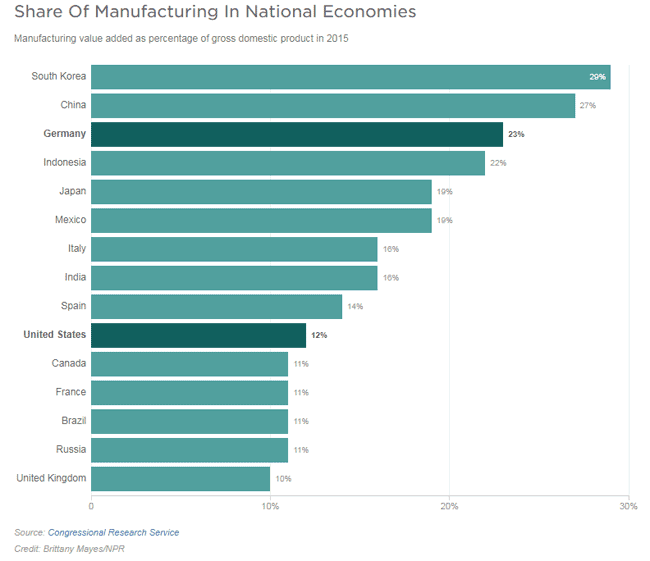In the face of global outsourcing, China and more, manufacturing remains the strength of the German economy.
Supply Chain Digest Says... |
|
|
As shown in the graphic below of the top 15 largest global economies, Germany ranks third in terms of manufacturing as a share of total GDP, at 23%. That puts the country behind only China (27%) and South Korea (29%) in that measure, and Germany's manufacturing share is almost double that of the US' 12%.
That manufacturing might is of course the key behind Germany's strength in exports, where Germany again ranks third behind the US and China. At about $1.3 trillion in exports, Germany is not far behind the US' $1.4 trillion, despite the fact that US GDP is more than five times that of Germany.
As SCDigest has written about before, a key to Germany's manufacturing strength is what well-known German businessman and author Hermann Simon calls "Hidden Champions," or what in Germany are known as the Mittelstand – export focused small and medium size manufacturers that often enjoy significant global market shares. (See Key to Germany's Continued Manufacturing Success is Low Profile, Mid-Sized "Hidden Champions.)
The web site of NPR recently published a column by John Ydstie on the Mittelstand, which notes that in Germany, the Mittelstand are seen as the foundation of the country's manufacturing success.

(Article Continued Below)
|
CATEGORY SPONSOR: SOFTEON |
|
|
| |
|
|
These German manufacturers are "often family-owned and focus on long-term success, not on maximizing short-term profits," Ydstie notes. "They pay attention to quality."
One CEO of a mid-sized manufacturer has some advice for the US: "Pay attention to your workforce. Don't presume every kid should go to college. Get them interested in making things."
Naturally, the question is whether this German mode should be the playbook for reinvigorating US manufacturing.
Ydstie writes that Martin Baily, an economist at the Brookings Institution, has studied this important question. Baily thinks that while it would be a good thing if the US had more manufacturing jobs for people who aren't highly educated, such an expansion would be very difficult to achieve.
"I would not advise US companies or US policymakers to try to replicate what's happened in Germany," Baily says. "In fact, I would look at Germany and say you're going to have a tough time going forward, in fact you're already having a tough time as some production shifts to Eastern Europe."
Baily notes that technology is advancing so fast that it will continue to displace even highly skilled manufacturing workers, even in Germany.
Some Germans are also worried about this, Ydstie says. For example, Jeromin Zettelmeyer, a former economic official in the German government who is now at the Peterson Institute for International Economics, says Germany may soon find that it is actually too reliant on manufacturing.
"There is a very serious worry that we might lose our manufacturing edge over the next 10-20 years and be in the same situation the US is now - except, without having grown a new growth engine like the IT sector in the meantime," Zettelmeyer says.
Alas, Yrstie does not really answer the question in the end if the German model should be adopted in some form in the US. But Germany's Hermann Simon previously had this to say on the subject: "The Hidden Champions provide a model of inclusive growth that are worth emulating," he said.
However, "Any foreign policymaker or economist seeking to foster a community of such companies in their own country should tailor their approach to that country's own unique conditions."
In other words, take the same general approach, but tailored to the strengths and unique aspects of the US economy.
Could the German approach to manufacturing be replicated in the US? Let us know your thoughts at the Feedback section below.
Your Comments/Feedback
|
|
Jon Kirkegaard
President, DCRA Inc. |
Posted on: Jan, 30 2018 |
|
The German model of apprenticeship and common sense economic understanding of the geometric positive impact "making things" and making things to export has on overall economy / employment is absolutely a concept to copy.
The theme of it in the US might be different to leverage our strengths, fill our weaknesses and leverage our geography but overall absolutely we need to put "making things" on a pedestal and reward those who risk capital, career and time to create and build.
For example, for decades we at DCRA Inc. have promoted a strategy of US government support for final assembly (postponed manufacturing) approaches in the US and particularly in Texas. This strategy encourages "making things" but does not ignore the reality that key elements of many products are produced for much less in certain parts of the world.
We can only sustain an economy that just sells financial services products to each other for so long :) |
|
|